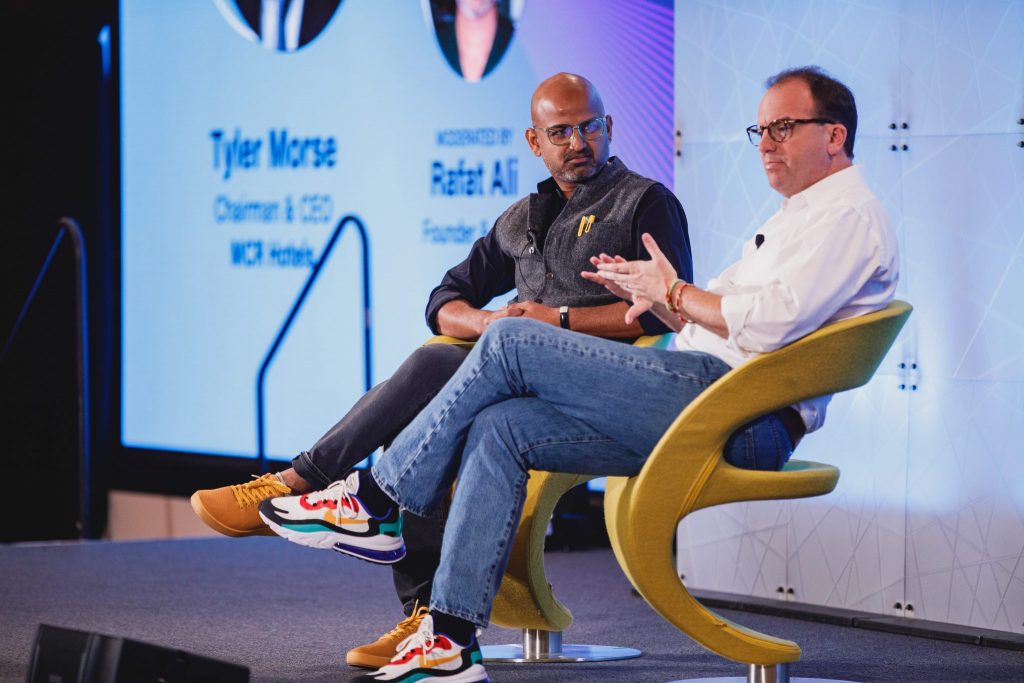Skift Take
Airlines shed their money-losing reputation by unbundling products and services and charging passengers on an à la carte basis. The recovering hotel industry could deploy the concept to make more money coming out of the pandemic.
The hotel industry should charge guests for add-on services just like airlines do, according to one of the largest U.S. hotel owners.
MCR Hotels CEO Tyler Morse is testing a pricing model around services and amenities at the company’s TWA Hotel at New York City’s JFK Airport. Things like early check-in, late check-out, use of the pool at peak hours, and faster WiFi are all available to guests — for an added fee on top of the daily room rate.
Some may balk at this a la carte pricing system, but Morse sees it as a way to generate more revenue while also providing guests with a lower base rate.
“I keep kind of trying to push the envelope here and say, as a hospitality business, stop giving things away for free,” Morse said Thursday at Skift Global Forum in an interview with Skift founder Rafat Ali. “Being hospitable does not mean giving people things for free.”
Prices range from $10 for early check-in to $20 for late check-out. Morse previously told the Wall Street Journal there is a $25 fee to use the hotel’s highly popular rooftop pool, which includes views of the JFK airfield, during peak times like the weekend.
“Business travelers never use the pool, so why should they pay inherently an indirect cost to use the pool,” Morse said. “It allows us to charge a lower rate to everybody, and then people can buy up for what they want. So, everybody gets a lower rate.”
Morse previously discussed an expected rocky transition period for guests to get used to such unbundling of services in the hotel sector, but it could become an industry norm similar to how airlines implemented similar measures.
There’s good reason to follow Morse’s take. MCR Hotels is the fourth-largest hotel owner in the U.S. by room count with more than 20,000 rooms in 34 states. The company’s portfolio is also rapidly growing: MCR acquired 41 hotels in the last 18 months.
The airline unbundling of services and charging up has been a financial windfall too good for hoteliers like Morse to ignore. Ancillary revenue from products and services for the airline industry was a major source of profitability leading up to the pandemic. Four airlines — Allegiant, Spirit, VivaAerobus, and Wizz Air — generated more ancillary revenue last year than they did revenue from ticket sales.
“To the extent the hotel business moves in that direction, the customer gets what they want,” Morse said. “Everybody gets a lower price point, and the industry becomes more profitable.”
But there has been pushback to the model: Marriott International CEO Anthony Capuano told the Journal in August he was skeptical owners would support the a la carte pricing model.
“[The major hotel company CEOs] all pay lip service to it but remember: They’re in the business of giving things away for free. That adds brand value,” Morse said. “We owners are in the business of not giving things away for free because it’s our bottom line. It doesn’t hurt [Marriott CEO] Tony [Capuano] or [Hilton CEO] Chris [Nassetta] to give things away for free. It hurts our P&L.”
Have a confidential tip for Skift? Get in touch
Tags: sgf2021, skift forum, skift live, TWA hotel
Photo credit: Skift founder Rafat Ali and MCR Hotels CEO Tyler Morse at Skift Global Forum Matt Matieiscu / Skift
